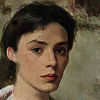Take a photo of a barcode or cover
Warning: This review contains some spoilers
Dead Souls became something of a book about morality to me. Throughout Chichikov's journey, the author made readers witnesses of how morality and money play a huge role upon the human soul. This novel follows an unlikeable hero—Chichikov, but I'm afraid to say that some readers might find some of Chichikov's characteristics likeable, even Gogol himself said "But the hard thing is not that readers will be displeased with my hero, what is hard is that there lives in my soul an irrefutable certainty that they might have been pleased with this same hero, this same Chichikov."
There's a lot to learn from this novel, I for one, learned a lot about writing from this book, the agonizing reality of a writer, and the complicated relationship a writer have with his readers. In a long rant about writing in one of the chapters, Gogol said "Yes, my good readers, you would prefer not to see human poverty revealed." owing to the fact that, readers, most of the time, prefers to read something good, something entertaining, the pleasurable side of things, stirring away the coarse and cruel side. "And so the money that would have helped somehow to straighten things out is spent on the means for making oneself oblivious." he added, hammering the lesson that for happiness and pleasure, we humans, would prefer to be oblivious and blind from the harsh reality that others suffer. Lastly he said, "Who, then, if not an author, must speak the sacred truth? You fear the deeply penetrating gaze, you are afraid to penetrate anything deeply with your own gaze, you like to skim over everything with unthinking eyes." to further elucidate that it is the writer's responsibility to arouse human awareness, to show these shunned corners of the human condition.
"But he is wise who does not scorn any character, but, fixing a piercing eye on him, searches out his primary causes. Everything transforms quickly in man; before you can turn around, a horrible worm has grown inside him, despotically drawing all life's juices to itself."
Of course, if we're going to be talking about those dirty corners, we should not ignore how Gogol expands themes of corruption, greed, deception, vanity, hypocrisy, and the inefficient handling of bureaucratic systems. The themes I mentioned are the main composition of this novel. The hero himself, has an identity which perfectly caters those undesirable themes and direct them towards the people of the upper class, which he took advantage of throughout his journey, and that of which Gogol satirizes to his heart's content. Gogol perfectly depicted corrupt officials, the treating of serfs as mere commodities, the rampant bribery, the endless lies, and the extravagant parties that the upper class indulged themselves with. The hero of the story is no different, he also enjoys the spoils, his principles doesn't align with that of the virtuous, perhaps because of the difficulty of his life and the way he was brought up, with his father's last words to him being: "A comrade or companion will cheat you and be the first to betray you in trouble; but a kopeck will never betray you, whatever trouble you get into. You can do everything and break through everything with a kopeck."
"It happens that a man sometimes sees such a thing in a dream, and afterwards he dwells on this dream all his life, reality is lost to him forever, and he is decidedly good for nothing anymore.
My overarching sight for this novel—and perhaps, even the author himself thought so—is that it is hopeless. In all our deep moral sense, we want death for dishonesty, we want injustice to perish, and most importantly we want human cunning to be used for the benefit of mankind. But as we progress in life, we learn that the possibility of them is very unlikely, as Gogol said using one of his characters in this novel "I know that no methods, no fears, no punishments can eradicate falsity: it is too deeply rooted. The dishonest practice of accepting bribes has become a need and a necessity even for people who were not born to dishonesty." What could be the conclusion of this novel? At first, I saw multiple possibilities, and then there's only two, and finally, I saw only one, a rather endless and hopeless one. Even though that's the way I perceived it, something good came of it, something profound, it presented to me a real moral question, in the words of Gogol himself:
"And who among you, filled with Christian humility, not publicly, but in quiet, alone, in moments of solitary converse with himself, will point deeply into his own soul this painful question: "And isn't there a bit of Chichikov in me, too?"
Dead Souls became something of a book about morality to me. Throughout Chichikov's journey, the author made readers witnesses of how morality and money play a huge role upon the human soul. This novel follows an unlikeable hero—Chichikov, but I'm afraid to say that some readers might find some of Chichikov's characteristics likeable, even Gogol himself said "But the hard thing is not that readers will be displeased with my hero, what is hard is that there lives in my soul an irrefutable certainty that they might have been pleased with this same hero, this same Chichikov."
There's a lot to learn from this novel, I for one, learned a lot about writing from this book, the agonizing reality of a writer, and the complicated relationship a writer have with his readers. In a long rant about writing in one of the chapters, Gogol said "Yes, my good readers, you would prefer not to see human poverty revealed." owing to the fact that, readers, most of the time, prefers to read something good, something entertaining, the pleasurable side of things, stirring away the coarse and cruel side. "And so the money that would have helped somehow to straighten things out is spent on the means for making oneself oblivious." he added, hammering the lesson that for happiness and pleasure, we humans, would prefer to be oblivious and blind from the harsh reality that others suffer. Lastly he said, "Who, then, if not an author, must speak the sacred truth? You fear the deeply penetrating gaze, you are afraid to penetrate anything deeply with your own gaze, you like to skim over everything with unthinking eyes." to further elucidate that it is the writer's responsibility to arouse human awareness, to show these shunned corners of the human condition.
"But he is wise who does not scorn any character, but, fixing a piercing eye on him, searches out his primary causes. Everything transforms quickly in man; before you can turn around, a horrible worm has grown inside him, despotically drawing all life's juices to itself."
Of course, if we're going to be talking about those dirty corners, we should not ignore how Gogol expands themes of corruption, greed, deception, vanity, hypocrisy, and the inefficient handling of bureaucratic systems. The themes I mentioned are the main composition of this novel. The hero himself, has an identity which perfectly caters those undesirable themes and direct them towards the people of the upper class, which he took advantage of throughout his journey, and that of which Gogol satirizes to his heart's content. Gogol perfectly depicted corrupt officials, the treating of serfs as mere commodities, the rampant bribery, the endless lies, and the extravagant parties that the upper class indulged themselves with. The hero of the story is no different, he also enjoys the spoils, his principles doesn't align with that of the virtuous, perhaps because of the difficulty of his life and the way he was brought up, with his father's last words to him being: "A comrade or companion will cheat you and be the first to betray you in trouble; but a kopeck will never betray you, whatever trouble you get into. You can do everything and break through everything with a kopeck."
"It happens that a man sometimes sees such a thing in a dream, and afterwards he dwells on this dream all his life, reality is lost to him forever, and he is decidedly good for nothing anymore.
My overarching sight for this novel—and perhaps, even the author himself thought so—is that it is hopeless. In all our deep moral sense, we want death for dishonesty, we want injustice to perish, and most importantly we want human cunning to be used for the benefit of mankind. But as we progress in life, we learn that the possibility of them is very unlikely, as Gogol said using one of his characters in this novel "I know that no methods, no fears, no punishments can eradicate falsity: it is too deeply rooted. The dishonest practice of accepting bribes has become a need and a necessity even for people who were not born to dishonesty." What could be the conclusion of this novel? At first, I saw multiple possibilities, and then there's only two, and finally, I saw only one, a rather endless and hopeless one. Even though that's the way I perceived it, something good came of it, something profound, it presented to me a real moral question, in the words of Gogol himself:
"And who among you, filled with Christian humility, not publicly, but in quiet, alone, in moments of solitary converse with himself, will point deeply into his own soul this painful question: "And isn't there a bit of Chichikov in me, too?"
funny
lighthearted
reflective
slow-paced
Plot or Character Driven:
A mix
Strong character development:
No
Loveable characters:
No
Diverse cast of characters:
No
Flaws of characters a main focus:
Yes
funny
mysterious
reflective
medium-paced
Plot or Character Driven:
A mix
Strong character development:
No
Loveable characters:
No
Diverse cast of characters:
No
Flaws of characters a main focus:
Yes
adventurous
funny
reflective
medium-paced
Plot or Character Driven:
Character
Strong character development:
Complicated
funny
reflective
slow-paced
Plot or Character Driven:
Character
Strong character development:
No
Loveable characters:
No
Diverse cast of characters:
No
Flaws of characters a main focus:
Yes
Part I is a masterpiece, Part II is fragmentary and to nowhere near the same standard - though who knows where it would have ended up?
Despite its age, Dead Souls remains impressively funny. I’d rate it higher if I thought that the points it seems to be making were more relevant. The book seems to be mainly relevant to 1800s Russia, and might remain relevant in many ways to people living in countries with corrupt local government.
adventurous
funny
mysterious
tense
slow-paced
Plot or Character Driven:
Character
Strong character development:
Complicated
Loveable characters:
Complicated
Diverse cast of characters:
Yes
Flaws of characters a main focus:
Yes
Finished at last! This is one only for those with a taste for 19th century Russian literature. I did enjoy some of it, and beautifully read, but the characters are so many and the names confusing (not helped by my listening only intermittently) that it was difficult to follow. Very, very Russian is probably my best way to describe it. Also I hadn’t realised that parts of the manuscript are missing, including the end, which didn’t help with my comprehension. I wouldn’t embark on it again.
Made it to the start of part 2 and just lost the will to continue.
challenging
emotional
reflective
sad
slow-paced
Plot or Character Driven:
A mix
Strong character development:
Yes
Loveable characters:
Yes
Diverse cast of characters:
Yes
Flaws of characters a main focus:
Complicated





